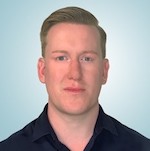The landscape of video capture is rapidly evolving – not only to accommodate for the impact of COVID-19 but also to address the increasing demand of designing patient-centric studies. Opportunities in clinical trials today are now moving towards home-based standardized video capture to address the impact of travel fatigue, limited clinical capacity and patient reluctance to expose themselves to unnecessary risk.
The failure rate of central nervous system (CNS) drugs in Phase 2 and 3 clinical trials is approximately 85%, second only to oncology. Poor study design is the number one reason for trial failure and the endpoints in CNS trials are usually subjective and not objective.
Endpoint protection is a crucial part of study design. Central assessments – rather than site assessments – can help overcome individual subjective site variation, and a central capture of standardised videos will enable all data capture to be assessed centrally or utilising computer vision.
One example is the SARAhome , which is a modification of the scale for the assessment and rating of ataxia (SARA), a reliable and valid scale to measure the severity of ataxia, tested in 5 trials including >600 patients with ataxias. SARAhome includes five domains to measure gait, stance, nose-finger test, alternating hand movement and speech, which is conducted at home and the videos are shared on a secure platform for assessment by a central assessor.
Patients follow a standardized order and video instruction guide. This was configured within an app available to patients on iOS and Android and currently available in English, German, Dutch and Portuguese. A main benefit of the SARAhome app is that it enables close monitoring of Ataxia symptoms within a significantly brief period of time; ataxia symptoms can be highly variable within a single day, from day-to-day and week to week. Travel to clinical sites can be stressful and time-consuming for patients, also impacting on a patient’s performance while being assessed and often leading to missed insight of disease variability.
A recent publication by Grobe-Einsler et. al. (2020) in The Journal Movement Disorders demonstrated the validity and feasibility of SARAhome. The first data from home application suggests that fluctuations in severity of ataxia exceed the expected range.
Another reason for trial failure is poor recruitment. CNS trial participants and their caregivers need exceptional support to enter and remain in clinical trials. CNS trial complexity puts undue pressure on sites and participants. Extensive help to alleviate the burden on both sites and trial participants due to the complex nature of CNS trials is needed. Sites find it increasingly difficult to keep up with the demands that sponsors place on them resulting in delays recruiting patients, processing trial data, and inadequate time to support participants resulting in poor retention.
This home-based video assessment is also being incorporated in other neurodegenerative studies where the Timed Up & Go (TUG), Activities of Daily Living (ADL) and disease hallmarks (e.g. seizures) are being implemented across many studies.
Register for this webinar to learn why allowing participants to share data from their own homes in a standardized way is one approach to enable a better clinical trial experience for participants, lead to better recruitment and retentions, and ultimately more timely completion of clinical trials.
Speakers

Dr. Clare Matthews, Data Scientist, Aparito
Clare has worked as a mathematician, data scientist and developer in both academia and industry. Her current role at Aparito is focused on using videos for remote clinical assessment. This work incorporates raw video analysis, computer vision and machine learning.
Previously, she has worked with a telematics company and national insurance provider to create a vehicle crash detection algorithm for use on mobile and telematics devices. At the National Physical Laboratory, she provided statistical data analysis and modelling for a wide range of projects, such as the calibration of micro-thrusters used for steering satellites and optimisation of smart electricity grids.
Her research career began at University College London, with a PhD in statistics in volcanology. More recently, at Bangor University, she has worked in the area of real-time summarisation of videos, primarily for the application of summarising daily events captured via wearable devices.

Dr. Nick France, MD, MRCPCH, Vice President Clinical Development, ESCAPE Bio
Dr. Nick France, MD (MBChB), MRCPCH serves as Vice President, Clinical Research and oversees the clinical development activities related to ESCAPE Bio’s clinical-stage candidates from first-in-human onwards. Dr. France trained in medicine in the UK working in pediatrics in London before joining industry in 2009, in which he has spent his career leading the development of new therapeutics for rare and neurological diseases, including senior physician leadership roles in the development and approval of recombinant factor VIII single-chain (CSL Behring), migalastat (GSK/Amicus) and extensive work on GSK’s gene therapy pipeline.
In addition, he served in senior leadership capacities in movement disorders at GSK for Parkinson’s disease (ropinirole prolonged release) and at Axovant as the lead for the Lewy body dementia and REM sleep behavior disorder programs. Dr. France received his medical degree from the University of Warwick, an Honors degree in pharmacology/neuropharmacology from Kings College London and is a member of the Royal College of Paediatrics and Child Health.

Dr. Marcus Grobe Einsler, DZNE
Dr. Marcus Grobe Einsler studied medicine in Bonn from 2008 to 2015 and received an award from The German National Academic Foundation. He wrote his thesis in the institute for neurodegenerative diseases as part of a working group in neural regeneration with Prof. Neumann, where he was granted the Bonfor scholarship. Marcus worked with induced pluripotent stem-cell-derived microglia, especially on the expression of the myeloid marker CD33 on microglia and its potential role in the pathogenesis of Alzheimer’s disease.
After finishing his studies and thesis, he started to work in the neurological department in Bonn (university hospital) in 2016. He is currently specializing in ataxia and autoimmune cerebellitis. In 2018, he also started to work as a study physician in the DZNE. Since then, he has been starting his own projects in the field of ataxia in Prof. Klockgether’s working group.
Who Should Attend?
This webinar will benefit those working in the following sectors:
- Biotech
- Pharma
- Emerging Biopharma
- CROs, especially those specialized in neurodegenerative disorders
- Medical Affairs
What You Will Learn
In this webinar, participants will learn about:
- Which symptoms can be standardised for at-home assessment
- The support required by patients and caregivers to enable standardised at-home assessment
- How best to incorporate such an approach into a clinical trial protocol
- Data protection and privacy considerations
- Regulatory buy-in
Xtalks Partner
Aparito
Aparito is a medtech company that specialises in capturing patient-generated data and developing digital endpoints remotely, with expertise in decentralised/hybrid trials. Aparito is a leader in innovative, patient-centric remote monitoring solutions, integrating specialist clinical and regulatory expertise. Using our technology, it is possible to capture real-world patient data through eQuestionnaires, videos, voice, pictures, and wearable device integration. Aparito provides knowledge with the technology to gather highly relevant patient-generated data across all patient groups.
You Must Login To Register for this Free Webinar
Already have an account? LOGIN HERE. If you don’t have an account you need to create a free account.
Create Account


